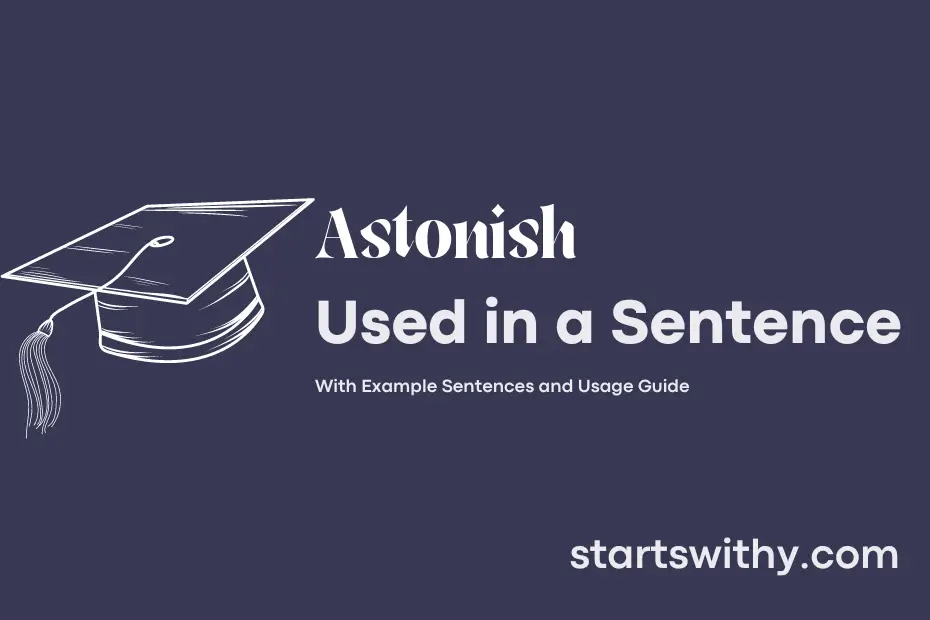Have you ever been witness to something truly astounding, something that left you completely startled or amazed? This feeling of surprise and wonder is what we often refer to as astonishment.
Astonishment is that powerful emotion that overtakes us when we experience something extraordinary, unexpected, or beyond our imagination. It causes us to pause, take notice, and react with a mix of disbelief and awe.
7 Examples Of Astonish Used In a Sentence For Kids
- The magician’s tricks always astonish us.
- The fireworks display will astonish everyone at the festival.
- The beautiful rainbow in the sky can astonish us with its colors.
- The acrobat’s stunts will astonish the audience at the circus.
- The size of the elephant at the zoo may astonish you.
- The butterfly’s vibrant colors will astonish you as it flutters by.
- The surprise birthday party will astonish the birthday boy.
14 Sentences with Astonish Examples
- Astonish your classmates with your amazing dance moves during the college fest.
- Attend a workshop that will astonish you with the latest technological advancements.
- Astonish your professors with a well-researched and insightful presentation.
- Participate in a debate competition and astonish everyone with your excellent argumentative skills.
- Astonish your friends by organizing a surprise birthday party for them.
- The guest speaker at the seminar will astonish you with his knowledge and experience in the industry.
- Astonish your parents by achieving an academic milestone that exceeds their expectations.
- Join a student club that will astonish you with the diverse range of activities and events they organize.
- The results of the college entrance exam will either astonish you with joy or disappointment.
- Use your creativity to astonish your peers with a unique project idea.
- Participate in a sports competition and astonish everyone with your athletic prowess.
- Collaborate with your classmates on a group project that will astonish your professors.
- Attend a cultural festival and astonish yourself with the richness of Indian traditions and heritage.
- Astonish your career counselors by securing an internship at a prestigious company.
How To Use Astonish in Sentences?
To use the word Astonish in a sentence, follow these simple steps:
-
Understand the meaning of Astonish: Astonish means to surprise or amaze someone greatly.
-
Think of a context: Consider a situation where someone is surprised, amazed, or shocked by something unexpected.
-
Formulate a sentence: Combine Astonish with a subject and verb to create a complete sentence. For example, “The magician’s tricks never fail to astonish the audience.”
-
Ensure correct usage: Make sure that the sentence structure is correct and that Astonish is used appropriately in the sentence.
-
Practice using Astonish in different contexts: You can try using Astonish in various scenarios to become more comfortable incorporating it into your vocabulary.
-
Seek feedback: Ask for feedback from someone else to confirm that you have used Astonish correctly in your sentence.
-
Expand your vocabulary: As you become more comfortable with using Astonish, continue to explore other new words to enhance your language skills.
By following these steps, you can effectively incorporate Astonish into your sentences and communicate more clearly with others. Remember to practice regularly to improve your proficiency in using this word confidently.
Conclusion
In conclusion, sentences with “astonish” evoke a sense of surprise, wonder, or shock. They are often used to describe moments of amazement or disbelief, highlighting the impact of a particular event or revelation. For example, “The magician’s tricks never failed to astonish the audience” demonstrates how astonish can capture a feeling of awe and admiration.
By incorporating “astonish” into sentences, writers can convey the sheer magnitude of an experience or achievement, ensuring that their readers are equally captivated by the unexpected or extraordinary. As such, using “astonish” effectively adds depth and emotion to written communication, making the language more vivid and engaging for the audience.



